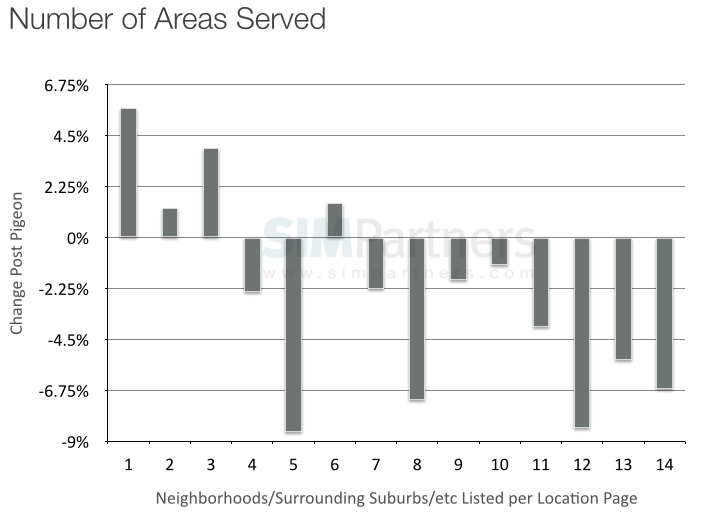Linda Buquet
Member
- Joined
- Jun 28, 2012
- Messages
- 13,313
- Reaction score
- 4,148
Adam Dorfman from Sim Partners just shared results of a Pigeon study which opens up a couple interesting theories.
Below are the main points made and my comments in blue...
1. Pigeon Does Not Equal Improved SERPs (Click above to read full details on this point)
Agree with that one.
2. Strong Domains Matter (Click above to read full details on this point)
We are seeing more EMDs and brands with City in name rank higher that's for sure.
But check out his link analysis using Moz authority. Interesting...
(Then see Michael's comment and my retort.)
3. Location Matters More Than Ever (Click above to read full details on this point)
Everyone keeps saying this - but I'm seeing more outliers rank than ever before.
Oftentimes even 2 - 4 in the pack are from other cities.
4. Don’t Over-Optimize Your Website
He shows a graph that indicates businesses that were aggressive in adding multiple zip codes and/or areas served were dinged.
My reply in comments:
"Especially noteworthy is # of cities or zips on a page of the site. Google changed webmaster guidelines a couple years ago to say that listing a big bank of cities, zips or phone#s is considered KW stuffing. But spammy SMBs like plumbers still do it - in excess. Maybe now practice is being dinged.
If so, that's the only good thing I've seen come out of Pigeon so far."
Anyway like I replied to Michael:
"I don't think of studies like this as pseudoscientific nonsense. I don't take them as gospel either. But it's helpful to me to gather any data people notice and even just opinions like in the LSRF, then weigh it all together to see what makes sense or track patterns between different studies.
Especially with this particular algo - there is no scientific study that could possibly make any sense of it!
It changes 3 times a day, is totally unpredictable and makes no sense at all. Plus what Adam's study observed 2 weeks post Pigeon, is different now AND depends on what time of day you check - due to rotating datacenters with different versions of the algo."
So one big takeaway I have after reading this - one thing I'll be paying attention to as I analyze rankings is whether the site has a big bank of city or zip service areas. I'll be looking to see whether spammy ones are still ranking OR if spammy ones that used to rank are no longer. (Can check by viewing G.ca or Classic maps.)
And as Adam suggests, if you have a client that dropped after Pigeon and has a big list of service areas, you may want to try removing to see if it helps. And as I stated above, that's been a spam signal for awhile now - maybe now it's finally a negative ranking factor.
What do you think???
<meta property="og:type" content="article"><meta property="og:title" content=""><meta property="og:description" content="Pigeon study opens up a couple interesting theories.">
<meta property="og:image" content="http://marketing-blog.catalystemarketing.com/wp-content/uploads/2014/08/pigeonRealDC.jpg">
<a href="http://searchengineland.com/factors-affecting-pigeon-5000-page-case-study-205862">Factors Affecting Pigeon -- A 5,000 Page Case Study</a>
At SIM Partners, we decided to do some homework first. We discovered that Pigeon has a number of implications for brands, such as the importance of attaching your local listings to strong domains.
We wanted to know how Pigeon affects crucial factors such as website traffic and ranking performance among businesses that depend on local listings. After analyzing the numbers, we concluded the following:
Below are the main points made and my comments in blue...
1. Pigeon Does Not Equal Improved SERPs (Click above to read full details on this point)
Agree with that one.
2. Strong Domains Matter (Click above to read full details on this point)
We are seeing more EMDs and brands with City in name rank higher that's for sure.
But check out his link analysis using Moz authority. Interesting...
(Then see Michael's comment and my retort.)
3. Location Matters More Than Ever (Click above to read full details on this point)
Everyone keeps saying this - but I'm seeing more outliers rank than ever before.
Oftentimes even 2 - 4 in the pack are from other cities.
4. Don’t Over-Optimize Your Website
He shows a graph that indicates businesses that were aggressive in adding multiple zip codes and/or areas served were dinged.
My reply in comments:
"Especially noteworthy is # of cities or zips on a page of the site. Google changed webmaster guidelines a couple years ago to say that listing a big bank of cities, zips or phone#s is considered KW stuffing. But spammy SMBs like plumbers still do it - in excess. Maybe now practice is being dinged.
If so, that's the only good thing I've seen come out of Pigeon so far."
Anyway like I replied to Michael:
"I don't think of studies like this as pseudoscientific nonsense. I don't take them as gospel either. But it's helpful to me to gather any data people notice and even just opinions like in the LSRF, then weigh it all together to see what makes sense or track patterns between different studies.
Especially with this particular algo - there is no scientific study that could possibly make any sense of it!
It changes 3 times a day, is totally unpredictable and makes no sense at all. Plus what Adam's study observed 2 weeks post Pigeon, is different now AND depends on what time of day you check - due to rotating datacenters with different versions of the algo."
So one big takeaway I have after reading this - one thing I'll be paying attention to as I analyze rankings is whether the site has a big bank of city or zip service areas. I'll be looking to see whether spammy ones are still ranking OR if spammy ones that used to rank are no longer. (Can check by viewing G.ca or Classic maps.)
And as Adam suggests, if you have a client that dropped after Pigeon and has a big list of service areas, you may want to try removing to see if it helps. And as I stated above, that's been a spam signal for awhile now - maybe now it's finally a negative ranking factor.
What do you think???
<meta property="og:type" content="article"><meta property="og:title" content=""><meta property="og:description" content="Pigeon study opens up a couple interesting theories.">
<meta property="og:image" content="http://marketing-blog.catalystemarketing.com/wp-content/uploads/2014/08/pigeonRealDC.jpg">





